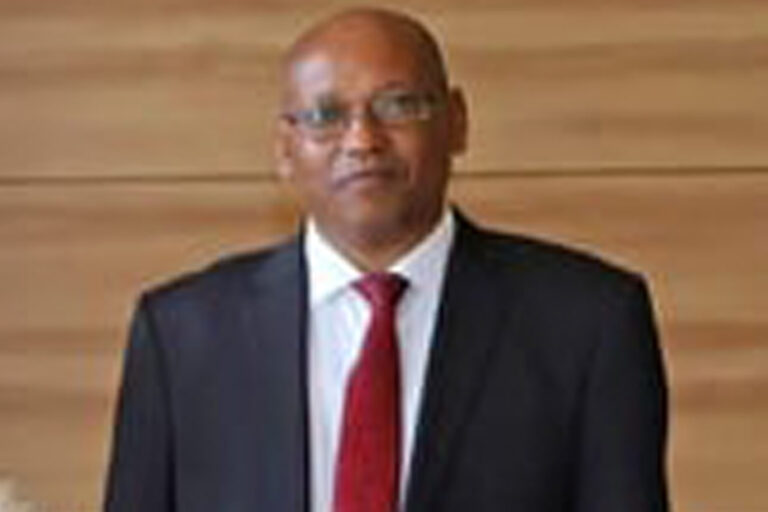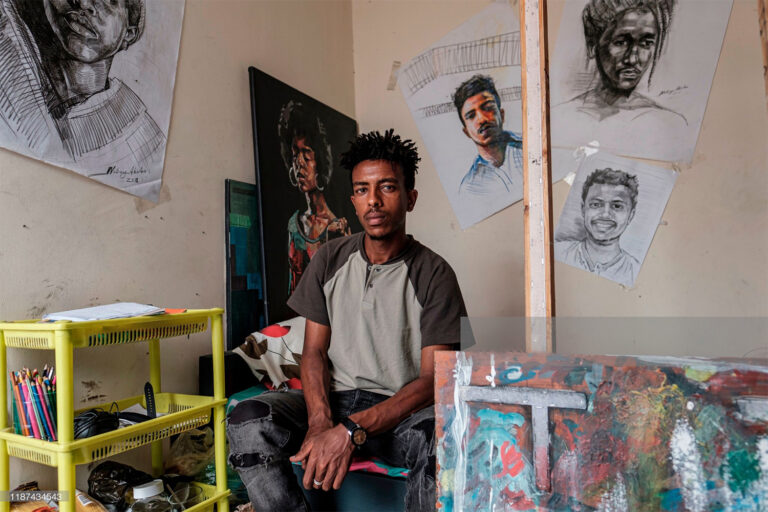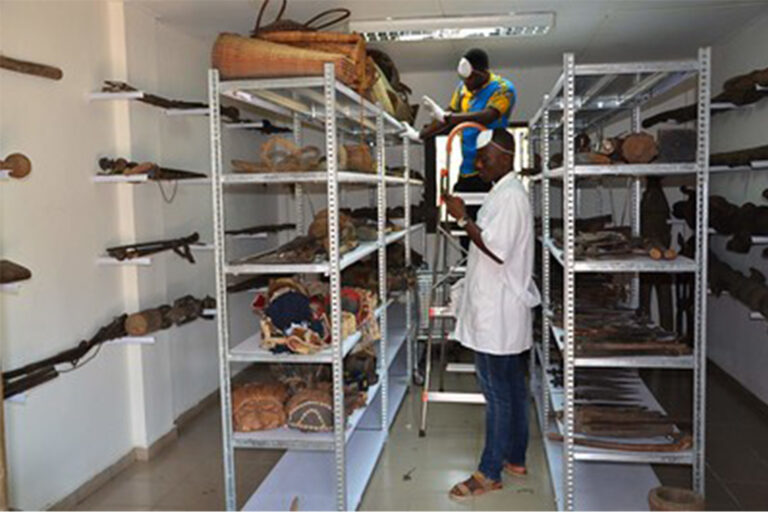Project HOPE is providing more than 56,000 N95 protective masks to Ethiopia to support COVID-19 response efforts. Project HOPE Country Representative Dawit Abraham presented the personal protective equipment to Minister of Health Dr. Lia Tadesse at a small handover ceremony, which will be used to protect health workers in handling COVID-19 cases in government health facilities and communities across the country.
Purchase, logistics and shipment costs for the protective masks were made possible through Project HOPE corporate funding. Project HOPE has been responding to the global COVID-19 pandemic since early February 2020. The organization has been operating in China – including the Wuhan province, where the disease was first reported – and is building upon lessons learned from fighting the outbreak there to inform its missions around the world.
Project HOPE donates 56,000 protective masks to Ethiopia
A helping hand
Djibouti has seen a rapid spike in corona virus cases with the Horn of Africa nation now recording the highest prevalence. The tiny but strategically important country that hosts major American, French, Chinese and other military bases, is also a strategic gateway for Ethiopia.
Thousands of Ethiopians led their lives in Djibouti. According to the Ethiopian embassy in Djibouti many of them work at the port and in other parts of the country which made them at risk of getting the virus and many are facing challenges of getting daily commodities including food. The Ethiopian embassy in Djibouti announced that it is providing direct support for needy Ethiopians who reside there to alleviate the challenges they face due to COVID 19 and helping them to pass this time. Capital talked to Ambassador Abdulaziz Mohammed, Ethiopian ambassador to Djibouti about the situation how the embassy is helping the Ethiopian community there. Ambassador Abdulaziz was appointed as an ambassador of Ethiopia to Djibouti on February, 2019. Excerpts;
Capital: What kind of support is the embassy giving to Ethiopians residing in Djibouti?
Abdulaziz Mohammed: Starting from the beginning of the pandemic in Djibouti we were telling Ethiopians to protect themselves from getting infected by the virus through social media, unions and Ethiopian public community unions. It is a known fact that many Ethiopians come to Djibouti every day and there are lots of people who live in Djibouti. Hundreds of trucks get in and out from Djibouti to Ethiopia and from Ethiopia to Djibouti which is the main sea outlet for Ethiopia. We have been working with different organization here in Djibouti to keep the safety of Ethiopian drivers who transport cargo from and to Djibouti. So we are working to provide certain protective equipments and giving them awareness on how to protect themselves from the virus.
To control the outbreak the government of Djibouti announced a lockdown some weeks back. Most of the Ethiopians who are living in Djibouti are living in a very poor condition, they are vulnerable. To tackle the challenges facing the Ethiopian community, we have been engaged on mobilizing finance from Ethiopians based in Djibouti and organizations to provide support. The Embassy has mobilized finance from its own staff at the mission and other sources to provide support for those in need.
The mobilization also targeted the call from the Ethiopian government to participate the Ethiopian community in the world to support the country to solve the same problem in Ethiopia.
Capital: Since it is a time of fasting season for Muslims do you think the number of people in need will increase?
Abdulaziz: Yes we are expecting an increase. Ninety percent of Ethiopians who live in Djibouti are relatively poor. Also Djibouti is used as a corridor for illegal Ethiopian immigrants to go to the Gulf nations. Most of the immigrants living in Djibouti are those who came to go to the Middle East, so they live by working as a daily laborer, and currently most of them has no job and income and are highly vulnerable to these challenges we are facing. As we try to estimate more than 10,000 Ethiopians in Djibouti need support. So we are working tirelessly to address those who need support. So far 4,000 Ethiopian community members are getting support via the embassy in two ways; direct cooked meal for those who are living on the streets of Djibouti and monthly food rations for those that resides in shelters.
Capital: How much did you mobilized so far?
Abdulaziz: We have obtained around one million birr. The staff at the mission has donated their one month salary, other regional institutions, individual Ethiopians residing in Djibouti, unions has participated in the resource mobilization.
The support is delivered in seven sub cities, and different areas in Djibouti city of Balbala, Arhiba and PK 12.
I want to appreciate the effort of the Ethiopian community that are giving priority for the situation than their work and engaged on the activity to support those who need support.
Capital: There are rumors that the Djiboutian government is forcing Ethiopians to return to their home in relation with the Covid-19?
Abdulaziz: There are no forced measure taken by the government of Djibouti to return Ethiopian migrants and refugees particularly in relation with coronavirus. Although the pandemic was highly spreading in Djibouti the migrants were not stopped from their journey.
Capital: What about the port and the logistic service, how is it going with the pandemic?
Abdulaziz: Regarding the port services everything is going smoothly as in the past, there is no interruption on the activities because of the virus. I consider it as it is a favor of Djibouti to Ethiopia, all the other activities in the country are banned although the government allows the port to continue as it was before. We all are working to increase the protections from the virus.
Capital: There are lots of returnees that came from neighboring countries such as Yemen and Saudi Arabia and other Middle Eastern countries to Ethiopia trough Djibouti, how are you facilitating their return?
Abdulaziz: Since the area is highly affected by illegal migration, illegal brokers use it to pass migrants to the middle-east. The embassy is working with IOM to return migrants based on their willingness. Before the pandemic we were working to return the migrants from camps in Djibouti, however because of the pandemic it become difficult and we have stopped it. Also even if it is not our mandate, we are working to return migrants from Yemen, by talking with the Ministry of Foreign Affairs. Generally everywhere if Ethiopians face challenge we try to help them as we can.
THE RETURN OF STOLEN AFRICAN ARTEFACTS BY EUROPEAN MUSEUMS
By Bob Koigi
A debate ignited by French president Emmanuel Macron in 2018 on the urgent need to return African historic treasures stashed in European and American museums is gaining pace while rekindling memories of Europe forceful entry to Africa and the impacts it has had on generations.
The cultural relics among them metal castings, human remains, carvings, manuscripts, photographs and sound recordings were moved from Africa either through the expeditions of the 1800s, stolen or acquired under questionable circumstances. Reports indicate that over 90 percent of these artworks lie outside Africa with numerous leaders calling on their repatriation as an honest gesture of addressing colonial injustices meted on the continent.
Mr. Macron has been at the forefront of championing Europe to return the artefacts and even commissioned a report in 2018 on African relics held in France Museum. The report dubbed ‘The Restitution of African Cultural Heritage: Toward a new relational ethics’ which was co-authored by renown French art historian Benedicte Savoy and Senegalese economist Felwine Sarr recommended France immediate plan on restitution of African relics including revision of the principle of ‘inalienability of public French art collections’, where French laws posit that any French collections are state property and cannot be given back irrespective of how they were acquired. Such legal hurdles have complicated claims by African countries who have requested to have their art work returned.
BENIN BRONZE SHAPE RESTITUTION DEBATE
Quai Branly museum in Paris houses 70,000 cultural objects from Sub Saharan Africa, 85 percent of all collections at the Africa Museum in Belgium are from the Congo and Humboldt Forum in Germany has in its possession 75,000 African traditional relics. From Africa, these treasures were either exchanged in Europe as gifts or sold at auction. The Benin Bronzes, made of brass, have particularly shaped the restitution debate due to the heightened publicity they have received in Europe and Nigeria where they were taken from.
In the 1897 expedition, British soldiers raided the Kingdom of Benin, the modern day Southern Nigeria, torching the royal palace and looting thousands works of art among them Benin Bronzes, a set of unique plaques that included statues of ivory leopard, carved elephant tusks, and wooden heads and that showcased war exploits. They were revered and reserved for ancestral altars and mothers of kings and queens in the kingdom.
Other notable African artefacts in Europe include the Egyptian Rosetta Stone in British Museum made of coarse grained rock, engraved with texts in multiple languages. It has been used by researchers to understand how Egyptian hieroglyphs, using pictures as signs, worked.
The Bangwa Queen wooden carving that is about 32 inches tall commands huge spiritual importance to the Cameroonians and embodied the health and power of the Bangwa people. Being one of the world’s most famous artefact of African nature, the sculpture that was taken by German colonialist Gustav Conrau found its way to Museum für Völkerkunde in Berlin before being sold for a record $3.4 million at an auction in New York.
SUB-SAHARAN AFRICA RETAINS ALMOST NOTHING
“Whereas many other regions of the world represented in Western Museum collections are still able to hold on to a significant portion of their own cultural and artistic heritage, this is not the case in sub-Saharan Africa which has been able to retain almost nothing,” noted the Macron report.
International museums have always defended the idea of preserving the African heritage in their countries arguing that Africa does not have the requisite infrastructure to take care of them.
But as the debate gains momentum, European countries have been exploring temporary repatriation where the artefacts are given to African countries on loan, a move countries like Ethiopia have vehemently opposed.
“The restitution of African heritage is a very crucial step in addressing colonialism and the impact it had on the African people. But it needs to be honest and guided by goodwill. There cannot be any justification why cultural artefacts that were designed by Africans and preserved by Africans for all centuries would now be given back to them on loan. You don’t loan what is not yours. There should be no conditions for the repatriation of the African heritage,” said Abebe Negasi a historian based in Ethiopia’s capital Addis Ababa.
Abebe argues that having the African relics in European and America museums is robbing an entire African generation a chance to connect with its past and appreciate its future an assertion supported by the Macron report: “On a continent where 60 per cent of the population is under the age of 20 years-old, what is first and foremost of great importance is for young people to have access to their own culture, creativity, and spirituality from other eras that certainly have evolved since, but whose knowledge and recognition can no longer merely be reserved for those residing in Western countries or for those who count themselves among the African diaspora living in Europe. The youth of Africa, as much as the youth in France or Europe in general, have a right “to their artistic and cultural heritage.”
(Fair Planet)
COVID-19 ALIPH to allocate emergency funding to protect cultural heritage
The ALIPH Foundation announced it would allocate emergency funding for cultural heritage and surrounding communities in conflict and post-conflict areas to help weather the impact of the COVID-19 pandemic.
Around the world, COVID-19 has forced the closure of museums, libraries and other cultural and heritage sites. In many cases, these lockdowns have brought important rehabilitation work to a stop. These sites represent important sources of employment for local operators, cultural institutions or associations, as well as experts, engineers, builders, and artisans.
In Gao, Mali, for example, ALIPH’s partners have had to put on hold a recently launched project to rehabilitate the Tomb of Askia. In Afghanistan, work had only just begun to restore the Buddhist Stupa of Shewaki, when workers were required to stop.
In response to the crisis, the Foundation has allocated an initial envelope of 1 MUSD for local operators to defray their operations, health, and staff costs. Information technology acquisition and online learning programs will be covered in order to bridge the digital divide and build resilience for the future. Emergency heritage preventive protection and income generation projects will also be supported.
Valéry Freland, ALIPH Executive Director said: “Working on cultural heritage protection in conflict areas means working with and for local communities. Behind every monument, every site, there are men and women who are bearing the brunt of the pandemic. This exceptional fund aims to help them overcome this difficult period and prepare for the relaunch, when the time comes, of our common work to protect heritage to promote development and reconciliation.”
ALIPH was launched in December 2016 in Abu Dhabi, following the massive destruction of cultural heritage in the Middle East and the Sahel as a result of wars and terrorism. At that time, the international community called for the creation of a new, agile, and flexible financial instrument to protect heritage in conflict zones. Today, thanks to the support of its public and private donors, ALIPH is financing nearly 50 projects in 14 countries on 4 continents. Supporting heritage operators as they face this unprecedented health crisis, which threatens not only culture but also stability, falls squarely within ALIPH’s mission to protect heritage to build peace.





